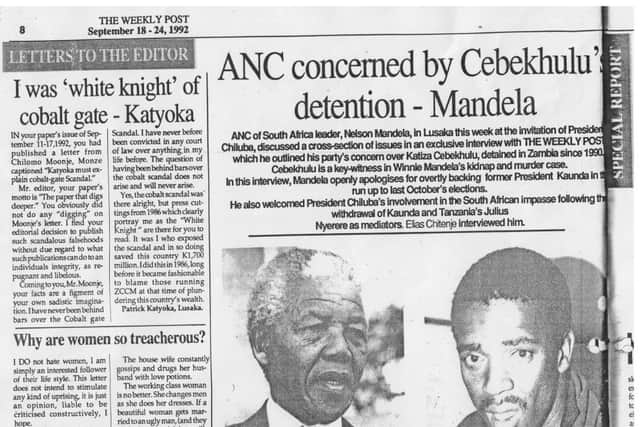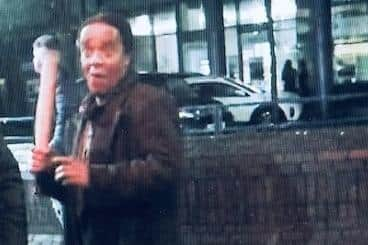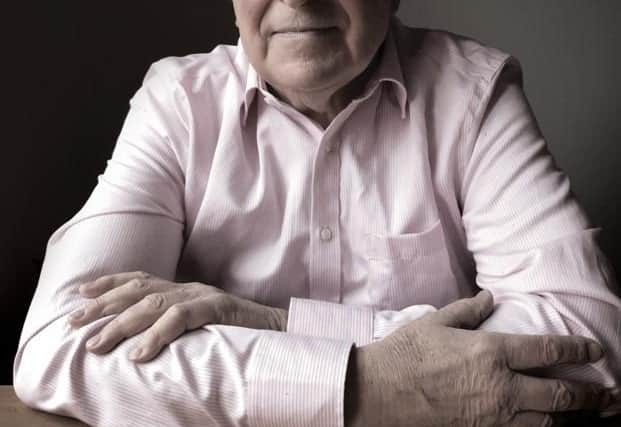Ex-Winnie Mandela vigilante left destitute on Portsmouth streets and facing 'likely assassination' in South Africa amid deportation order from government
and live on Freeview channel 276
But Katiza Cebekhulu, 52, is also facing an immediate battle for survival after his ‘horrific’ situation has seen him ‘fall through every welfare crack’ leaving him homeless.
It means the former member of the infamous Mandela Football Club is in danger of being sent back to jail - which the Southsea man said he would prefer than being on the streets.
Advertisement
Hide AdAdvertisement
Hide AdCebekhulu was spared prison at Portsmouth Crown Court on April 12 after a judge decided it would be ‘unjust’ to impose the statutory minimum sentence of six months jail for repeat knife offenders.


The ruling was made after the court heard of his troubled past in South Africa that left him struggling to cope and suffering from post traumatic stress disorder.
Cebekhulu became involved in a dispute on February 2 around 6pm at the Society of St James hostel in Elm Grove where he stayed.
Cebekhulu said he had been assaulted by a man before he went to arm himself with a ‘large kitchen knife’ and declared he was going to ‘deal with him’ before he was calmed down.
Advertisement
Hide AdAdvertisement
Hide AdThe former vigilante, who has been living in Portsmouth for around 20 years, admitted a charge of possessing a knife, was handed a 24-month community order with 20 rehabilitation days and told to complete 150 hours of unpaid work.


He was also given a 12-week alcohol abstinence monitoring requirement with an electronic tag.
But after being reprieved from a jail term, Cebekhulu has found himself destitute after he was not allowed to return to the Society of St James hostel and has been turned away by other places.
Cebekhulu, speaking of his plight, told The News: ‘I am still sleeping in the park. I have been on the street since April 8. It is very cold at night.’
Advertisement
Hide AdAdvertisement
Hide AdHe added: ‘I am still wearing the clothes from when I was released from prison. I have nowhere to keep my other clothes.


‘I would rather go back to prison than sleep in the rain.’
Author and journalist Fred Bridgland, who rescued Cebekhulu from a Zambian jail with former MP Baroness Emma Nicholson and has written two books on his struggles, remains a friend and is trying to help him.
Mr Bridgland, a former foreign correspondent, told The News Cebekhulu is the subject of a deportation order made several months ago by home secretary Priti Patel as well as being involved in a daily struggle for survival.


He said: ‘When Mr Cebekhulu was arrested, before appearing for his court sentence, he lost his place in the hostel where he was living and cannot return there, even to pick up his meagre possessions.
Advertisement
Hide AdAdvertisement
Hide Ad‘He has been unable to find alternative accommodation, not least because he has no income.
‘A human rights lawyer has appealed an order for Mr Cebekhulu’s deportation by Priti Patel. The lawyer is optimistic that the deportation order will be repealed, but it will take time.
‘In the meantime Mr Cebekhulu has no right to benefits and is prohibited from taking work. He therefore has no income for food or to put a roof over his head. He is homeless and destitute in the most extreme sense of those words.’
Mr Bridgland said his old friend had ‘fallen through every possible welfare crack and is currently living on Portsmouth’s streets’.
Advertisement
Hide AdAdvertisement
Hide AdThis is despite being diagnosed with PTSD, ‘largely as a result of his horrific experiences with Mrs Mandela and her vigilantes’.
Mr Bridgland, who has been sending Cebekhulu money and contacting hostels and the city council on his behalf, said the former vigilante will eventually be sent to jail due to his circumstances. ‘For his monitoring requirement to be effective he needs a permanent address,’ he said.
‘But Katiza has been living on the streets since he cannot return to his previous accommodation and he has not been unable to find somewhere new to live.
‘He would have been better off being sent to prison where at least he would have had a bed and be warm and have meals.’
Advertisement
Hide AdAdvertisement
Hide AdThe writer said steps should have been taken by the court to ensure Cebekhulu could meet the requirements imposed. ‘The judge should have had a way of fulfilling that (Cebekhulu) would have a roof over his head,’ he said.
Speaking of the deportation application, he said: ‘Katiza has a right to stay in the UK but was never given full asylum rights.
‘If Priti Patel deports him back to South Africa he will likely be assassinated because there are still a lot of Winnie Mandela sympathisers there.’
Cebekhulu rose to prominence after becoming the so-called ‘missing witness’ from the high-profile Johannesburg trial in which Winnie Mandela, wife of Nelson Mandela, was accused of the torture and murder of 14-year-old boy Stompie Moeketsi.
Advertisement
Hide AdAdvertisement
Hide AdCebekhulu had claimed he saw Winnie Mandela stab the boy – thought to be a police spy. Cebekhulu disappeared on the eve of the 1991 trial in which he was expected to testify against Winnie Mandela.
He was subsequently imprisoned in Zambia at the request of Nelson Mandela before Mr Bridgland, working as a reporter in Africa at the time, and Baroness Nicholson came to his rescue.
‘(Cebekhulu) was put in prison there to stop him giving evidence in the trial in South Africa,’ Mr Bridgland said.
He said Cebekhulu was also due to testify that Winnie Mandela had ordered the killing of her own doctor who was a witness to the murder of Stompie.
Advertisement
Hide AdAdvertisement
Hide AdMr Bridgland added: ‘With the help of the MP I got him out of the Zambian prison and he came to Britain.’
SEE ALSO: Waterlooville woman who has helped Ukrainians for a decade says Russian destruction is heartbreaking
When Cebekhulu came to Britain he initially worked in a care home in Godalming, Surrey, before the administrators bought a care home of their own in Portsmouth and employed him.
‘Katiza worked there and has been in Portsmouth ever since,’ Mr Bridgland said. ‘The owners of the Portsmouth care home eventually sold up and moved to Devon, leaving Katiza stranded.
‘He’s been taking odd jobs until his recent conviction.’
Contact to home him has been made with the Portsmouth Rough Sleeping Hub.
Advertisement
Hide AdAdvertisement
Hide AdCebekhulu remains destitute with no money or food and just the clothes on his back while facing an uncertain future, including the possibility of being thrown to the wolves in his native land if the deportation application goes through.
But the city council has offered a glimmer of hope in the meantime.
A council spokesman said: ‘We do not comment on anyone's housing case because it is a private matter, but we will provide every assistance we can to any rough sleepers in Portsmouth and we are in contact with Katiza.’
The council has a Rough Sleeping team who support anyone rough sleeping, or at risk of rough sleeping, regardless of their immigration status.
Advertisement
Hide AdAdvertisement
Hide AdAccommodation is sometimes available and support is also offered in the form of a named keyworker to help them receive bespoke advice. This includes working with partners such as The Red Cross, Friends without Borders and Citizens Advice.
Access to the council's Homeless Day Service is available to anyone rough sleeping regardless of their immigration status. This service includes a meal, shower facilities, laundry facilities, access to computers and internet and support from on-site access to a GP and mental health worker.
